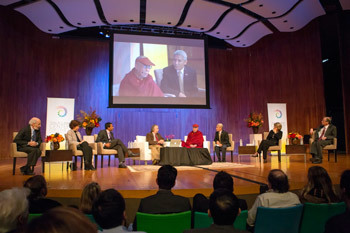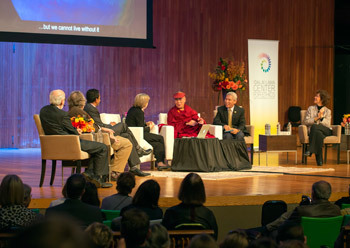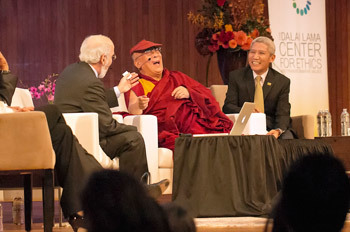Boston, MA, USA, 15 October 2012 - Today, the Center for Ethics invited His Holiness the Dalai Lama to participate in a forum at the Kresge Auditorium, MIT, under the banner Global Systems 2.0. It was dedicated to exploring Ethics, Economics and Environment in the morning, and Peace, Governance and Diminishing Resources in the afternoon.
Kerry Emanuel began by recalling that the first calculations about the warming effects of increased carbon dioxide in the atmosphere were made in 1906, but that what was then predicted would take 1000 years has in fact taken only 100 years. The planet is warming up. The question is not whether it is happening, but what the result will be. If we are going to take action, we need to act soon. How can humanity be persuaded to make material sacrifices to counter climate change? And why is the public so resistant?

|
His Holiness the Dalai Lama and fellow panelists at the morning session of the Global Systems 2.0 Forum at MIT's Kresge Auditorium in Boston, MA, on October 15, 2012. Photo/Christopher Michel
|
His Holiness remembered that while he was in Tibet, he had no idea about ecological issues. He only began to be aware of them when, having been accustomed to drinking from any water source in Tibet, he was cautioned in exile to be more careful. He said,
“Climate change is not like other kinds of violence that have an immediate impact. Environmental change is not sufficiently visible. Once it becomes obvious, it’s often too late to do anything about it. This is serious. We have a responsibility to act because we have no option to move elsewhere. The moon, which looks so beautiful in the sky, and which is the object of so much poetic admiration, would actually be a horrible place to live. Our blue planet is the only home we have.”
He suggested that it is our self-centred attitude that impedes our concern for the welfare of future generations. Education is the only solution to this. Experts must talk more and the media should broadcast what they say. Protecting our environment is not a luxury we can choose to enjoy, but a simple matter of survival.
Rebecca Henderson observed that the world’s population has tripled in her father’s lifetime and doubled within her own. She said all we need to do is change the world’s economy. We need to change from resources being cheap and waste being free to resources and waste being properly priced. She predicted that it would cost 2-3% of world GDP to take carbon out of the atmosphere. Once we started costs would come down. The bad news is that this is a human problem and transforming large systems is hard. Many people believe that the present economic system is moral; it creates goods, wealth and employment. We need to respect that, she said. So, what can be done? Establish a well-designed regulatory regime, accurate pricing and support for innovation.
She asserted that decarbonising the economy is possible. There is positive potential in the world’s 1000 largest corporations making up 30% of the world economy for increasing consensus that ‘business as usual’ may have unacceptable social and economic consequences. “To say we can’t move unless the whole world moves is really a cop-out,” she remarked. His Holiness was asked who takes the first step. He replied,
“Logically, when we face problems, we have to adopt a realistic approach. If we do that there may be short-term setbacks, but in the long term there will be benefit. Often people seem to think that taking others’ interests into account means that somehow you neglect your own. In fact, you take the greatest care of your own interests explicitly by extending your concern to others.”

|
Penny Chisholm making a presentation to His Holiness the Dalai Lama and fellow panelists at the Global Systems 2.0 Forum at MIT's Kresge Auditorium in Boston, MA, on October 15, 2012. Photo/Christopher Michel
|
With regard to measures business can adopt, he recalled that about 10 years ago in Stockholm a friend explained that fish had completely disappeared from the local river. Now fish have reappeared, not because industry has closed down, but because they have adopted measures to reduce their polluting emissions. Business can adapt without having to stop making money. However, His Holiness shook his head as he considered the real problem of population increase.
Penny Chisholm made a presentation about geo-engineering, irreversible techniques about which she herself is in two minds. However, she has also written a couple of books for children in an attempt to introduce environmental understanding to them early on. When she suggested that we need to be cautious about steps we take, His Holiness responded, “No, we have to be realistic.”
In the afternoon, John Foley discussed complex issues dealing with food and the future. His Holiness referred to predictions from the 1980s, when the world population was six billion and scientists questioned whether the world’s natural resources could sustain that many people and raise their standard of living. Prof. Foley said we tend not to make decisions about such issues on the basis of enlightened reasoning, in other words rationally and dispassionately; our viewpoint tends to be influenced by an emotional response.
The good news, however, was that as education increases, population decreases, even in a single generation. Therefore, the most important form of birth control is education. His Holiness acknowledged that only when they have enough food are people in a position to pay attention to education, culture and values. But education ensures that change comes about voluntarily.
Zeynep Ton spoke about how good jobs and good profits can go together. Discussing retail employment, she suggested that customers can choose to shop with companies they know take care of their employees and who successfully set employees’ and customers’ interests ahead of shareholders’.
His Holiness said that since the 80s he has mooted the need for a world body made up of experts, scientists, retired politicians etc dedicated to and advising about the welfare of humanity. He reiterated his real concern for the undiminishing gap between rich and poor. He said,
“It seems our only recourse is to pray, and prayer isn’t necessarily very effective.”

|
His Holiness the Dalai Lama enjoying a moment of laughter during John Sterman's presentation at the Global Systems 2.0 Forum at MIT's Kresge Auditorium in Boston, MA, on October 15, 2012. Photo/Christopher Michel
|
John Sterman proposed going back and asking what is the real problem. The problem is growth; growth in the population and growth in the economy. He asked what creates well-being, observing that over the last 40 years people in the USA have become twice as rich and yet people are no happier. Research has revealed that many people would be content to earn less, just as long as they earned more than others. He suggested that instead of a Manhattan Project approach to change involving experts making an intense effort, a better model would be the civil rights movement that involved large numbers of motivated people.
Invited to offer his concluding remarks, His Holiness said he completely agreed. The benefits of material values are limited. Real inner peace, when your mind is relaxed 24 hours a day and you have no stress or anxiety, comes from the mind itself. The mind’s potential for growth is infinite and unlimited. There is no room for complacency. Nor should we think only in terms of narrow, short term interests. Concern for others and their rights yields great inner strength. We need to adopt a sense of secular ethics, a position that does not dismiss religion as a source of values, but regards all such views with respect.
“The solution is education; educating the coming generations so they may be wiser than us. We need to mobilise a non-violent revolution, whose principal weapon is truth.”















